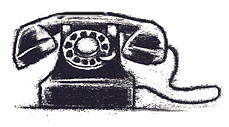 |
 |
|
by Graham Rayman
"Mr. Watson, come here, I want you."
It wasn't so long ago-- a blip in time, geologically-- that Bell uttered these famous, somewhat ambiguous words across a tangle of wires to an assistant at the birth of the telephone age. And it wasn't too much later that pundits, theorists, and prognosticators of every stripe and mustache length began to puzzle and pontificate over the social and cultural impact of this new technology on American society. They wrote papers. They argued at conventions. They produced reports. They traded phone numbers. They proclaimed that this new technology, like the discovery of fire at the dawn of humanity, would change your life. Compared with the telephone debate, rumination about cyberspace has been relatively brief. The phone was invented in 1876, and in the 1930s, whole gangs of pundits were still arguing over its significance for American society. In fact the debate still rages. So if you're sick of cyberblather about the Net, my advice is, you'd better get used to it. Nobody really knew what would happen with the advent of the telephone, but almost every theorist forecast that the changes would be revolutionary. An 1881 issue of Scientific American, for example, proclaimed the telephone would create a "kinship of humanity" by allowing far-flung communities to talk to each other. A less optimistic theory held that the wires of the telephone lines carried germs that could infect everyone who spoke into a receiver. Commentators claimed the telephone would fuzz out regional dialects until we all sounded the same: probably something like Brokaw or Katie Couric. They worried that the telephone would end letter-writing. They theorized that within a few years, the need for historians to keep written records would disappear; that one day, as S.C. Gilfillan wrote in 1912, consumers would dial up the Met to hear a soldout opera. Some theories revolved around the effect of the phone on personal freedom. One side maintained the phone would give the repressive government a line directly into the home. The other side held that it would allow Americans to criticize the government with more freedom. The Knights of Columbus wondered if the telephone would create a nation of lazy people, who wouldn't need anymore to leave their desks to talk to each other. They worried that it would break up home life, and that it would stop people from visiting their friends. Science fiction writer H. G. Wells said the telephone would reduce traffic jams. Futurist Herbert Casson held that the phone would enhance the bonds between citizens. Sociologist Charles Horton Cooley said it would subvert local ties in favor of nationalistic concerns. Academics, sociologists, commentators filled the air with their questions: Would it bring remote farmers into society? Would it reduce class barriers, or merely reemphasize them? Would it destroy community in favor of far-flung relationships? Or would the telephone simply replace the back fence, as Malcolm Wiley and Stuart Rice argued in a 1933 report for President Hoover's Commission on Social Trends. Would it create a nation of people on edge, waiting for that next call, thereby destroying some pastoral aspect of society? Would it reduce privacy by allowing solicitors in the house, or eavesdropping by government security? Would it allow people to conceal affairs and other "illicit" activities from the public? Urban politics experts asserted as early as 1902 that the telephone enabled the construction of skyscrapers because one no longer needed to be on the ground to conduct business. And others argued that the phone altered the shape of American cities by de-emphasizing the importance of having the institutions of government and commerce in the center of town. In his 1992 book, America Calling, University of California historian Claude Fischer asserted that it was impossible to prove that any of these things occurred. Instead, he concluded, after a detailed study of the phone-use habits of Americans in the late 1800s and early-to-mid 1900s, that the phone merely became another convenience, more like the washing machine than like fire. "The telephone," Fischer wrote, "did not radically alter American ways of life; rather Americans used it to more vigorously pursue their characteristic ways of life." |

|
